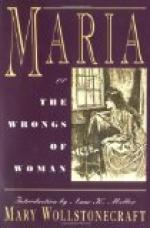Some lines were here crossed out, and the memoirs broke off abruptly with the names of Jemima and Darnford.
APPENDIX
ADVERTISEMENT*
THE performance, with a fragment of which the reader has now been presented, was designed to consist of three parts. The preceding sheets were considered as constituting one of those parts. Those persons who in the perusal of the chapters, already written and in some degree finished by the author, have felt their hearts awakened, and their curiosity excited as to the sequel of the story, will, of course, gladly accept even of the broken paragraphs and half-finished sentences, which have been found committed to paper, as materials for the remainder. The fastidious and cold-hearted critic may perhaps feel himself repelled by the incoherent form in which they are presented. But an inquisitive temper willingly accepts the most imperfect and mutilated information, where better is not to be had: and readers, who in any degree resemble the author in her quick apprehension of sentiment, and of the pleasures and pains of imagination, will, I believe, find gratification, in contemplating sketches, which were designed in a short time to have received the finishing touches of her genius; but which must now for ever remain a mark to record the triumphs of mortality, over schemes of usefulness, and projects of public interest.
* Presumed to have been written by Godwin [Publisher’s note].
CHAPTER 15
DARNFORD returned the memoirs to Maria, with a most affectionate letter, in which he reasoned on “the absurdity of the laws respecting matrimony, which, till divorces could be more easily obtained, was,” he declared, “the most insufferable bondage.” Ties of this nature could not bind minds governed by superior principles; and such beings were privileged to act above the dictates of laws they had no voice in framing, if they had sufficient strength of mind to endure the natural consequence. In her case, to talk of duty, was a farce, excepting what was due to herself. Delicacy, as well as reason, forbade her ever to think of returning to her husband: was she then to restrain her charming sensibility through mere prejudice? These arguments were not absolutely impartial, for he disdained to conceal, that, when he appealed to her reason, he felt that he had some interest in her heart.—The conviction was not more transporting, than sacred—a thousand times a day, he asked himself how he had merited such happiness?—and as often he determined to purify the heart she deigned to inhabit—He intreated to be again admitted to her presence.




